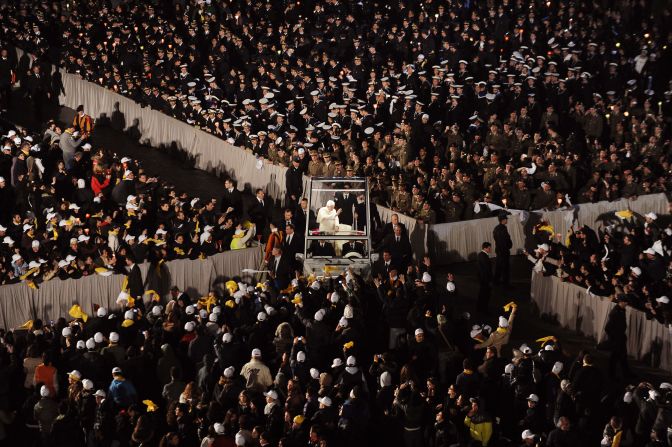Story highlights
Top Vatican official condemns "often unverified, unverifiable or completely false news stories"
Rumors are intended to put pressure on cardinals, Secretary of State Tarcisio Bertone says
Italy's La Reppublica has published allegations involving a shadowy network of gay clergy
Pope Benedict XVI is to stand down from office on Thursday
The Vatican sought Saturday to tamp down rumors involving sex, money and gay priests that have been swirling in the Italian media and have been linked by some to Pope Benedict XVI’s decision to resign.
The strongly-worded denial came on the eve of the pope’s last Angelus blessing, expected to draw huge crowds of the faithful, before he stands down on Thursday.
Vatican Secretary of State Tarcisio Bertone said it was “deplorable” that as the time for the Roman Catholic cardinals to elect a new pope approaches, a rash of “often unverified, unverifiable or completely false news stories” has appeared.
Such unfounded stories “cause serious damage to persons and institutions,” he said, and are an attempt to influence the cardinals’ free will in the election “through public opinion.”
Opinion: There’s more to the Catholic Church than the pope
Bertone did not address the specific claims that were first published in La Repubblica, the country’s largest circulation daily newspaper, on Thursday and Friday.
The newspaper stories center on an investigation last year by three cardinals into a scandal involving leaks from the Vatican.
La Repubblica, citing unnamed sources familiar with the investigation, alleged that the investigation revealed a series of scandals involving sex, money and power that touch cardinals, priests and lay people that work in the Vatican.
Vatican spokesman the Rev. Federico Lombardi declined to comment on La Repubblica’s article in a media briefing on Thursday.
CNN Senior Vatican Analyst John Allen, also a correspondent with the National Catholic Reporter, suggested in a piece written Friday that unsourced speculation about a shadowy “gay lobby” within the Vatican should be taken with a grain of salt.
But, he said, while he doesn’t know for sure if the three cardinals did investigate networks based on sexual orientation, “frankly, it would be a little surprising if they hadn’t” – given past scandals that have become public concerning clergy involved in homosexual activities.
The pope may well have been worn down by the “cumulative impact of the various meltdowns over the last eight years,” Allen said.
“However,” he added, “it’s probably a stretch to draw a straight line between all of this and Benedict’s resignation. For the most part, one has to take the pope at his word: He’s stepping aside because he’s old and tired, not because of any particular crisis.”
The pontiff will leave office at 8 p.m. on February 28, two-and-a-half weeks after he shocked the Roman Catholic world by announcing his resignation.
The Vatican has said a new pope will be in place for the Church’s Easter celebrations on March 31.
Benedict on Saturday concluded a week-long spiritual retreat, held to mark the Lenten period.
Addressing the clergy who had joined him, he thanked them “not only for this week, but for these past eight years that you have carried with me – with great skill, affection, love and faith – the weight of the Petrine ministry,” referring to the papacy.
Benedict also met with Italian President Giorgio Napolitano on Saturday, an encounter described by the Vatican as “particularly warm and cordial.”
The pontiff is considering changing the Vatican constitution to allow a vote for his successor to begin before March 15, Lombardi said Wednesday.
Existing rules say the Roman Catholic Church’s cardinals should start voting on a replacement from 15 to 20 days after the papal throne becomes vacant. With Benedict due to depart on February 28, the cardinals’ conclave ordinarily would start no sooner than March 15.
But Lombardi has said that because Benedict was leaving the papacy through resignation rather than death, the Vatican would explore the possibility of selecting a new pope sooner than normally prescribed.
The so-called “Vatileaks” scandal last year led to the pope’s butler, Paolo Gabriele, being convicted on charges of leaking private papers from the Vatican in a high-profile trial and sentenced to 18 months in prison.
Although Gabriele was pardoned weeks later by the pope, the whole affair – which revealed claims of corruption in the church’s hierarchy – was damaging to the Vatican’s reputation.
The latest media allegations, despite the strenuous Vatican denials, may add to the pressure for reform.
CNN’s Hada Messia and Ben Wedeman reported from Rome, and Laura Smith-Spark wrote from London.
































